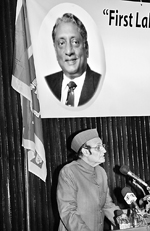|
His vision for South Asia must guide us: Karan Singh
President of the Indian Council for Cultural Relations (ICCR) Dr. Karan Singh delivering the first Lakshman Kadirgamar memorial lecture on Thursday said that the vision of the late Mr. Kadirgamar for bilateral and regional cooperation across South Asia must continue to guide us.
Welcoming the gathering, BCIS Chairman, Deshamanya M.D.D Pieris paid rich tributes to the departed leader who was a brilliant scholar, respected statesman and institution builder. “We need to celebrate his life rather than grieve his death,” he said.
“We stand ready to share with you our own experience of unity in diversity, plural democracy and devolution,” he said, speaking of India’s model of plural democracy and devolution, which has stood the test of time. We in India have also struggled with terrorism and the forces of separatism, having lost two Prime Ministers to the forces of fanaticism.” Excerpts of Dr. Karan Singh’s speech: “India and Sri Lanka are pluralistic societies - multi-regional, multi-linguistic, multi-cultural and multi-religious. India sustains itself through a gamut of languages that derive from the same roots and yet maintain their rich flavours. The same, on a smaller scale, is the case in Sri Lanka. We are culturally diverse communities, which believe in mutual respect and respect and sensitivity to the variety and multiplicity that is an integral part of our nature, our society and our inheritance. Indeed, the common strains between Sri Lanka and India’s forms of dance, music, musical instruments, literatures, religions, food, fabric, apparel and so on, are living proof of the sharing that is so much a a part of our mutual heritage. We in India firmly believe in the strategic role that we are required to play in today’s rapidly changing world. As a multi-cultural civilization with rich repositories of memories, refinement and values that are mature and distilled, we see ourselves as bearers of foundational ideals of special relevance to the modern world, ideas which demand a blend of the ancient and the contemporary, of the old and the new, of the past and the future. India is a model of pluralistic unity. Multiplicity is embedded in every aspect and detail of our lives and behaviour. This respect and sensitivity to diversity, and a conscious decision to allow for the freedom of variety to coexist peaceably and dignity, is also enshrined in the Constitution of our country. Relations between India and Sri Lanka are built on a solid bedrock of common culture, common spiritual values, a shared commitment to democracy and to independence in the conduct of foreign policy. As colonized nations in the post-colonial present, both India and Sri Lanka are boldly facing challenges that the global world presents today. We are consciously building on a common development experience. It is India’s policy to maintain close, cordial and cooperative relations with Sri Lanka at both the popular and governmental levels. As the late Shri Rajiv Gandhi said: ‘it is not mere geographical proximity which binds us. Ours is a relationship of heart and mind, finding expression in history and philosophy, literature and art, and in our contemporary concerns and daily lives.’ Today, more than ever, the bandwidth of our engagement for mutual benefit is wide and comprehensive. Our bilateral economic relations have shown considerable dynamism and innovation in the SAARC region, setting a benchmark for other countries to follow. The frequent high-level political dialogue between our two leaderships reflects our close ties. We have an obvious interest in the ethnic issue, given that India and Sri Lanka’s closest neighbour and we are culturally connected communities across the Palk Straits. India steadfastly supports the efforts being made by the government and people of Sri Lanka to consolidate the processes of peace and development in their country. India’s support for a comprehensive negotiated settlement acceptable to all communities, and reflecting the pluralistic nature of Sri Lankan society, within the framework of a united and democratic Sri Lanka, remains undiluted. Excellencies and friends, we appreciate your efforts to build a national consensus on a solution within a united Sri Lanka and on the basis of maximum devolution. We stand ready to share with you our own experience of unity and diversity and pluralism in a multi-ethnic society. It is also necessary for the full enjoyment of democracy as well as maximum participation in the vast enterprise of development. A model of plural democracy and devolution has been implemented in India which stood the test of time, and its principles and benefits are surely relevant to Sri Lanka as well. We in India have also struggled with terrorism and the forces of fanaticism. We are of the view that firmness combined with dialogue and communication is the only way to overcome such aberrations. In the immortal words of the Buddha, ‘hatred is never banished by hatred. Hatred is banished only by love. This is the eternal law.’ Acts of violence targeting innocent victims can have no justification or rationale. There is no grievance that can make us accept such behaviour, no political thesis or claim of ‘root causes’ can be adequate justification for terrorist actions. Our opposition to terrorism has to be firm and unwavering, resisting any temptation to compromise for tactical or political ends. Terrorism seeks to exploit the space offered by democratic societies, and to mislead those who equate accommodation and tolerance with weakness. We must not, however, allow terrorism to succeed in undermining the ancient humanist and civilizational values of South Asia, foremost among them being the celebration of diversity and the accepted of pluralism as an existential necessity. The loss of Lakshman Kadirgamar shows that today, if there is fuller awareness of the dangers that threaten us, it has not been without a terrible price. The price has been paid, but the sacrifice must not be in vain. We have to build a new world from the debris of the past and harness all our creative energies at many levels in this effort, overcoming age-old conflicts of boundaries and borders between and within nations. Our Regional Association – SAARC - should develop along the lines of the European Union, one of the most remarkable and positive developments of the twentieth century. Lakshman Kadirgamar’s vision for bilateral and regional cooperation across South Asia must continue to guide us. India and Sri Lanka relations have a special role in the vast and noble enterprise of South Asian regional integration. There is no doubt that our people have benefited and will continue to do so from expanding trade and economic cooperation. Closer connectivity and interaction between our two economies is the way to a bright future of shared prosperity. |
||||
Copyright © 2006 Wijeya Newspapers
Ltd. All rights reserved. |

